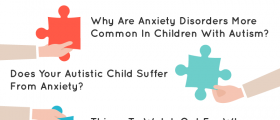
What is an Intellectual Disability?
Intellectual disability is a term widely used to group together various cognitive impairments which could have an onset at any age. Intellectual disability includes all stages of mental retardation, from mild to severe, as well as disorders caused by physical trauma to the brain, disorders characteristic of the senior population and learning disabilities. When it comes to mental retardation, individuals who suffer from this disorder are incapable of performing at least two major activities, with their IQ being fairly low. Mental retardation is usually used as a synonym of intellectual disability, but one should keep in mind that there are many various kinds of intellectual disabilities. For instance, cognitive disability does not necessarily mean a low IQ, but it could mean a person is getting old and losing cognitive functioning. In addition, there are various kinds of cognitive impairments that are caused by a physical trauma to the brain, or incidence of drug abuse, stroke, or illness. Suffering from an acquired brain injury that results in intellectual disability does not entail inheriting a genetic disorder, but rather encompasses factors that produce cognitive impairment after birth. There are many instances in which individuals suffer from acquired brain problems, but hold on to their intellectual capacities.
In the case of children with intellectual disabilities, the development takes longer, while in many cases they have limited social, mental and physical skills. When it comes to learning disabilities, individuals have trouble performing specific tasks such as math problems, reading, writing and the like. Individuals with learning disabilities need lots of support and encouragement from the loved ones to try and overcome their obstacles, regardless of the fact that a learning disability is a continuous type of disorder.
Causes of Intellectual Disability
It is important to note that intellectual disability is not a disease and it cannot be passed on from person to person, while at the same time it is not a psychological disorder, either, like anxiety or schizophrenia. Intellectual disability is a state that cannot be fixed or cured, but individuals affected by it can learn to function and enjoy life after investing a lot of time and effort. When it comes to the specific causes of intellectual disability, experts have separated them into health causes, causes developed during pregnancy and birth and genetic causes. Elements that are related to health that lead to intellectual disabilities are poor nutrition, exposure to toxic substances and illnesses such as meningitis. Also, if a pregnant woman abuses drugs or alcohol, gets an infection that has strong adverse effects on the baby, or the baby loses oxygen at birth, there is a strong possibility that the child will be intellectually impaired. Finally, in many instances intellectual disability is caused by genetically inherited malformed or malfunctioning genes. An example of intellectual disability produced by genetic problems is actually Down syndrome.
Signs and Diagnosis of Intellectual Disability
When it comes to signs of intellectual disability in children, they are fairly easy to detect and include behaviors such as not thinking lucidly, not being able to solve problems, poor social skills, inability to understand consequences and acquiring skills such as speaking and walking at a later stage than normal. Consequently, clinical professionals will look at the person’s ability to rationalize, acquire new knowledge and apply it to solve problems when diagnosing an intellectual disability. They will also look at whether the individual is able to live independently or needs assistance in performing everyday duties. In many cases, an IQ test will be administered as one of many ways used to recognize an intellectual disability.
Tips for Teachers and Parents
Teachers need to be very well informed about the type of an intellectual disability that a pupil is dealing with in order to provide adequate help and support. Teachers play a crucial role in the lives of children with a cognitive impairment and they need to be able to relate to them. For instance, taking more time, being more specific, using more visual aids, allowing more time for breaks, breaking down problems into smaller steps and similar activities are very beneficial for a student with an intellectual disability. Similarly to the teachers, the parents need to be well educated about the problems their child is experiencing, while being armed with lots of hope, patience and time. Every child needs to have responsibilities, so it is important that the parents engage their cognitively impaired child in everyday chores and house work, while giving constant feedback and praise. There are likely to be communal activities for intellectually disabled children and it would be beneficial for the child if he or she was involved. Creating a support system composed of other parents and caregivers of children with cognitive disabilities can greatly benefit the parents and give them more sources of information.

















Your thoughts on this
Loading...